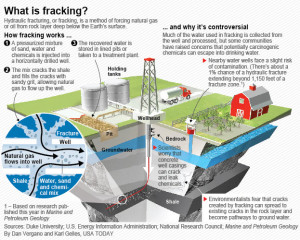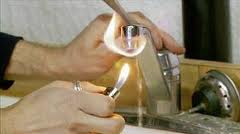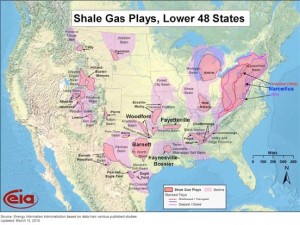 Despite a recent USA Today headline indicating that public support for “Fracking” is growing, those close to the subject, like those who live near the new type of Natural Gas and Oil drilling sites, see things very differently. Their drinking water has become undrinkable, toxic, and even flammable, and in many cases the health of the families has been severely affected.
Despite a recent USA Today headline indicating that public support for “Fracking” is growing, those close to the subject, like those who live near the new type of Natural Gas and Oil drilling sites, see things very differently. Their drinking water has become undrinkable, toxic, and even flammable, and in many cases the health of the families has been severely affected.
The process of Horizontal Hydraulic Fracturing, or “fracking”, involves drilling deep wells into large shale deposits which have been detected below some 36 states in the U.S. currently. Between 1 and 8 million gallons of water, mixed with 596 chemicals, many toxic including known cancer causing agents, are forced a high pressure into the well to fracture the deposits releasing some oil and large quantities of natural gas. The amount of natural gas believed to be available could make the U.S. the largest producer of natural gas on the planet.
 The problem with the method of extraction, however, goes back to the toxic mix of chemicals used in the process, and the fact that over half of the toxic mix is left behind in the drill site. The chemicals and a lot of the natural gas then leech into the drinking water in underground wells, and also into rivers. Planned drilling in Pennsylvania and New York would lead to toxic pollution of the rivers and streams which feed into the drinking supply for all those in major metropolitan areas of New York, New Jersey, Pennsylvania and Delaware.
The problem with the method of extraction, however, goes back to the toxic mix of chemicals used in the process, and the fact that over half of the toxic mix is left behind in the drill site. The chemicals and a lot of the natural gas then leech into the drinking water in underground wells, and also into rivers. Planned drilling in Pennsylvania and New York would lead to toxic pollution of the rivers and streams which feed into the drinking supply for all those in major metropolitan areas of New York, New Jersey, Pennsylvania and Delaware.
 While some argue that the Fracking process is safe, one has to wonder why the Bush administration exempted the Oil companies from complying with the Safe Drinking Water Act. “In 2005, the Bush/ Cheney Energy Bill exempted natural gas drilling from the Safe Drinking Water Act. It exempts companies from disclosing the chemicals used during hydraulic fracturing. Essentially, the provision took the Environmental Protection Agency (EPA) off the job. It is now commonly referred to as the Halliburton Loophole.”
While some argue that the Fracking process is safe, one has to wonder why the Bush administration exempted the Oil companies from complying with the Safe Drinking Water Act. “In 2005, the Bush/ Cheney Energy Bill exempted natural gas drilling from the Safe Drinking Water Act. It exempts companies from disclosing the chemicals used during hydraulic fracturing. Essentially, the provision took the Environmental Protection Agency (EPA) off the job. It is now commonly referred to as the Halliburton Loophole.”
This means that the fracking process is not subject to any oversight or regulation from the Environmental Protection Agency (EPA).
A recent HBO documentary titled GASLAND (watch it here) airing this month shed light on the issue and documented families all around the country who are dealing with the results of drilling on or near their property in this manner. While some will try to debate the side effects of the Fracking process, the simplest solution is to allow the EPA to do its job and oversee the process. Insiders from the EPA have voiced their concerns about the process, but until the law is changed the EPA is not allowed to get involved because the companies, including Halliburton are exempt from EPA regulations and oversight.
New York recently passed legislation negating the exemption from federal law in a effort to prevent the pollution of its water supply. A bill is currently circulating in congress. Known as the FRAC Act (Fracturing Responsibility and Awareness to Chemical Act), it is a House bill intended to repeal the Halliburton Loophole and to require the natural gas industry to disclose the chemicals they use. If passed this the FRAC Act will remove the exemption at the federal level and allow the EPA to do its job. Individuals are urged to contact their representatives in congress and tell them to support the measure which will provide the Environmental Protection Agency which is sorely needed, and currently missing, in this process.
![Herbal Reference Substances are Key to Everyday Products <!-- AddThis Sharing Buttons above -->
<div class="addthis_toolbox addthis_default_style " addthis:url='http://newstaar.com/herbal-reference-substances-are-key-to-everyday-products/3512112/' >
<a class="addthis_button_facebook_like" fb:like:layout="button_count"></a>
<a class="addthis_button_tweet"></a>
<a class="addthis_button_pinterest_pinit"></a>
<a class="addthis_counter addthis_pill_style"></a>
</div>When it comes to quality control testing and the development of new products, Botanical Reference Materials (BRMs), also known as Herbal References are critically important. To help companies ultimately obtain all-important FDA approval, the Food and Drug Administration provides in its guidance a recommendation that […]<!-- AddThis Sharing Buttons below -->
<div class="addthis_toolbox addthis_default_style addthis_32x32_style" addthis:url='http://newstaar.com/herbal-reference-substances-are-key-to-everyday-products/3512112/' >
<a class="addthis_button_preferred_1"></a>
<a class="addthis_button_preferred_2"></a>
<a class="addthis_button_preferred_3"></a>
<a class="addthis_button_preferred_4"></a>
<a class="addthis_button_compact"></a>
<a class="addthis_counter addthis_bubble_style"></a>
</div>](http://newstaar.com/wp-content/uploads/2021/02/Achillea_millefolium_flowers-100x100.jpg)
![Quality Electrochemical Biosensors are Critical for Medical, Food and Chemical Industry <!-- AddThis Sharing Buttons above -->
<div class="addthis_toolbox addthis_default_style " addthis:url='http://newstaar.com/quality-electrochemical-biosensors-are-critical-for-medical-food-and-chemical-industry/3512086/' >
<a class="addthis_button_facebook_like" fb:like:layout="button_count"></a>
<a class="addthis_button_tweet"></a>
<a class="addthis_button_pinterest_pinit"></a>
<a class="addthis_counter addthis_pill_style"></a>
</div>A number of industries have, at their core, a need to frequent or even continuous analysis of biological media. These include the medical and pharmaceutical fields, biotech firms, and food and chemical companies. To maintain quality standards and develop new products, these industries rely heavily […]<!-- AddThis Sharing Buttons below -->
<div class="addthis_toolbox addthis_default_style addthis_32x32_style" addthis:url='http://newstaar.com/quality-electrochemical-biosensors-are-critical-for-medical-food-and-chemical-industry/3512086/' >
<a class="addthis_button_preferred_1"></a>
<a class="addthis_button_preferred_2"></a>
<a class="addthis_button_preferred_3"></a>
<a class="addthis_button_preferred_4"></a>
<a class="addthis_button_compact"></a>
<a class="addthis_counter addthis_bubble_style"></a>
</div>](http://newstaar.com/wp-content/uploads/2020/10/Electrochemical-Biosensor-100x100.jpg)
![Company Develops Industrial Mixers Well-Suited for both Fragile and Explosive Products <!-- AddThis Sharing Buttons above -->
<div class="addthis_toolbox addthis_default_style " addthis:url='http://newstaar.com/company-develops-industrial-mixers-well-suited-for-both-fragile-and-explosive-products/3512071/' >
<a class="addthis_button_facebook_like" fb:like:layout="button_count"></a>
<a class="addthis_button_tweet"></a>
<a class="addthis_button_pinterest_pinit"></a>
<a class="addthis_counter addthis_pill_style"></a>
</div>Industrial drum mixers are normally applied to blend mixes of varying viscosities such as adhesive slurries or cement. Some of these mixers have the capability of blending mixes of very different particle sizes such as fruit and ice cream, and gravel and cement slurry. The […]<!-- AddThis Sharing Buttons below -->
<div class="addthis_toolbox addthis_default_style addthis_32x32_style" addthis:url='http://newstaar.com/company-develops-industrial-mixers-well-suited-for-both-fragile-and-explosive-products/3512071/' >
<a class="addthis_button_preferred_1"></a>
<a class="addthis_button_preferred_2"></a>
<a class="addthis_button_preferred_3"></a>
<a class="addthis_button_preferred_4"></a>
<a class="addthis_button_compact"></a>
<a class="addthis_counter addthis_bubble_style"></a>
</div>](http://newstaar.com/wp-content/uploads/2020/06/bandeau-sofragir2-100x100.jpg)